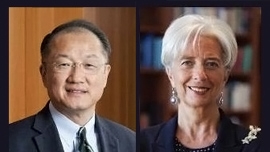Without serious action, the world is on a trajectory toward being around 4 degrees centigrade warmer by the end of this century, which could put at risk decades of achievement in poverty reduction. At this flagship event, the heads of the World Bank and the IMF make the economic case for tackling climate change, and a panel will discuss how the two institutions are aligning their effotts to help countries put smart climate action into place.
Watch live: The event will be streamed live online at World Bank Live.
Speakers:
Jim Yong Kim, President, World Bank Group
Christine Lagarde, Managing Director, International Monetary Fund
Panel:
Manuel Pulgar-Vidal, Environment Minister, Peru
Keith Akekelwa Mukata, Deputy Minister of Finance, Zambia
Richard Bon Moya, Under Secretary and CIO, Department of Budget and Management, the Philippines
Sunita Narain, Center for Science and the Environment (via video conference from New Delhi)
Rachel Kyte, Vice President for Sustainable Development, the World Bank
Michael Keen, Deputy Director, Fiscal Affairs Department, International Monetary Fund
Moderator:
Zanny Minton-Beddoes, Economics Editor, The Economist
